|
Enter content here Alehouse in Flames. Firefighters prevented the explosion of three 20 litre gas bottles in the centre of Sofia. At 12.00 o'clock huge flames reduced to ashes the 'Bulgaria' alehouse opposite 'Yalta' club. Seconds before the explosion of the bottles, the firefighters managed to take them out. In all likelihood the fire was deliberately provoked. PHOTO Kiril Konstantinov Ekaterina Dafovska of Bulgaria reacts after completing the Olympic women's 15 km individual biathlon at Soldier Hollow, during the Salt Lake 2002 Olympic Winter Games February 11, 2002. Dafovska finished fifth in 48 minutes, 15.5 seconds, 46.4 seconds behind gold medalist Andrea Henkel of Germany. REUTERS/Alexander Demianchuk CONSCRIPTS - OATH. 600 conscripts join the gendarmerie and the Sofia fire service taking an oath of service in the Vrana base. photo by Bistra Boshnakova, BTA. Assisted by relatives, the mother, center, of the 37 year-old Macedonian Ace Stojanovski enters St. Salvation church in Skopje's suburb of Madzari during her son's funeral ceremony Monday, Feb. 11, 2002. Ace Stojanovski was killed Sunday in a booby trap explosion in his house in the neighboring village of Aracinovo. (AP Photo/Boris Grdanoski) EDS NOTE: NAMES NOT AVAILABLE ON RELATIVES Relatives carry out of a vehicle a coffin with the body of the 37 year-old Macedonian Ace Stojanovski, during a funeral ceremony at St Salvation church in Skopje's suburb Madzari, Monday, Feb. 11, 2002. Stojanovski was killed Sunday in a booby trap explosion in his house in the neighboring village of Aracinovo. (AP Photo/Boris Grdanoski) Protesters in front of the National Assembly building raised slogans such as "No to tax terror," "180 days" "180 lies" and "We want to stay and work in Bulgaria." Lyulin Stamenov/Sofia Echo A 84-year-old D-type engine is the first item of the new exhibition of the Museum of Transport and Communications arranged in the premises of the passenger terminal of Sofias Central Train Station. The opening of the exhibition on Monday marked the 135th anniversary of railway transport in Bulgaria. Lyulin Stamenov/Sofia Echo Discussing Military Issues. Macedonian Defense Minister Vlado Popovski and his Hungarian counterpart Janos Szabo (L) review the honor guard during a welcoming ceremony in Budapest, February 11. cEPA Avtoprogres Tetovo Robbed Sunday Night. MIA Tetovo, February 11 (MIA) - New cases of demolished and robbed properties and vehicles, belonging to Macedonians were reported Sunday night in Tetovo.
The criminal acts were committed over the warehouses and facilities of Avtoprogres Stock Holding Company in Tetovo, as well as over facilities in several other districts of Tetovo town, reported MIA's correspondent.
The police sources say that some uncontrolled and armed gangs entered the property of Avtoprogres in Tetovo and demolished some supplemental warehouses of the manufacturing plant, stealing thereby some tools, spare parts and products.
The warehouse of the servicing plant, specialized in freight vehicles and agricultural machines, was also robbed.
An expert team from the Police Department in Tetovo performed Monday morning investigations on site. Police Investigation On Bomb Blast In "Butel 1" MIA Skopje, February 11 (MIA) - The anti-terrorist police unit in a presence of the deputy district attorney investigated "Justa" store, owned by Nusret Dema in the shopping center "Zivko Brajkovski" in "Butel 1" district in Skopje, as a hand grenade was activated in the store on Monday morning at 04.40h.
The police investigation indicated that first the entrance door was broken, and then the bomb was thrown inside the store. The blast caused material damage and broken glass.
The investigation continues in order to identify the perpetuator. POLICE PATROLS ENTERED SEVERAL VILLAGES IN TETOVO AND GOSTIVAR AREA. MIA Monday morning, the ethnically mixed police units entered the following villages: Radiovce, Tenovo, Otunje, Jedoarce, Setole, Varvara and Brezno. Contrary to the schedule, the police failed to enter Mala Recica village.
On Monday the ethnically mixed police units failed to enter and perform their patrolling tasks in the villages of Forino, Cegrane and Korito.
According to the Media Activity Center at the Coordinate Body for crisis management, the police patrols entered Monday for the first time in Tumceviste, Vrbjani, Orkuse and Duf villages.
As anticipated with the police units' redeployment plan, some contacts between the ethnically mixed police patrols and the top authorities of the villages were made and a cooperation among the OSCE representatives, the European monitors and NATO - Amber Fox mission was initiated Monday, on the so-called "M-day". Confidence Building Is Dead In Arachinovo. Reality Macedonia By Irina Gelevska
Skopje - The funeral of the 37-years-old Aco Stojanovski, who was killed yesterday in the village Arachinovo near Skopje, took place at 14.00 at the Madjari graveyard in Skopje, after the autopsy performed by the Macedonian Police experts.
They are trying to find the exact cause of the death of Aco Stojanovski. The police already know that the explosive device that exploded when Stojanovski unlocked the door of his brother's house in Arachinovo, was a booby-trap. The police are still trying to find out the type of the explosive that was used to make this hand-made booby-trap.
According to the Minister of Police, Ljube Boshkovski, there are a few suspected people from Arachinovo who are involved in this latest incident.
The bomb was a hand grenade type "Kashikara", Yugoslav made.
The motive for the attack is that the brother of Aco Stojanovski was a policeman, and the bomb probably was meant for him, not for his brother. The second victim in this bomb attack, Tomislav Stojanovski, was a relative of Aco Stojanovski. He suffered several injuries to his left shoulder, left chest, stomach and left leg. The doctors have pulled out about 30 pieces of explosive device out of his body during the surgery. Since last night his condition is stable but still remains critical.
The displaced persons from Arachinovo, now living in Skopje as refugees, are having a series of meetings in order to make a list of demands which are going to be asked from the President Boris Trajkovski and the Prime Minister Ljubcho Georgievski. It is expected that the Prime Minister will receive a delegation of Arachinovo refugees tomorrow and the Cabinet of the President Trajkovski have also scheduled a meeting.
The wife of the dead Aco Stojanovski has refused to meet both the Prime minister and the President. "Who is going to look after our three children, now?"-is everything that Mrs. Stojanovska is saying at the moment.
OSCE and NATO have made an observation at the place of the incident. The NATO Spokesman in Skopje, Craig Ratcliff, asked what the Task Force Fox were doing yesterday at the incident site, said that they are here to protect the observers and they will make no reports about it. SECURITY FORCES TO REDEPLOY IN ALL CRISIS REGIONS BY END OF MARCH. MIA 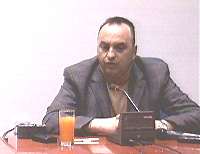
"An explosive device was activated on Sunday in the house owned by Velce Stojanovski, member of the special unit 'tigers,'" Macedonian Interior Minister Ljube Boskovski said at Monday's session of the Assembly Committee on internal policy and defense.
According to him, Sunday's incident in Aracinovo village near Skopje is "a tragic event that brings insecurity" and is not in relation with the efforts for restoring the security in all segments.
Speaking of the current political-security situation in the country, Boskovski assessed that progress has been made in realizing the obligations arising from the Framework Agreement, especially after the adoption of the Law on local self-government and the Statement of President Boris Trajkovski on amnestying all former members of "NLA."
"The security forces will enter in all crisis area by the end of March," Boskovski stressed, pointing out that the process for peaceful reintegration will be fully realized then.
"This speaks of the low chances for spring offensive," Boskovski emphasized.
"However, we should face the fact that the members of the so-called ANA continue to create structures, where the former 'NLA' was active," he stressed, adding that after September 26, 2001 the armed groups would not be tolerated and the Macedonian security forces will deal with them according to the Constitution and the Law on Interior Affairs.
The new plan on police redeployment in the crisis villages envisages immediate 24h patrols, if the conditions allow that. With this change the phases of five, seven or ten-hour patrols will be skipped. Macedonian Official Issues Warning. AP By KONSTANTIN TESTORIDES, Associated Press Writer
SKOPJE, Macedonia (AP) - Macedonia's hard-line interior minister accused an armed ethnic Albanian splinter group Monday of carrying out hit-and-run attacks to destabilize the volatile Balkan country.
Interior Minister Ljube Boskoski claimed the little-known Albanian National Army, or ANA, was preparing more actions against Macedonian regular forces.
"This is low-level war, ANA wants to destabilize Macedonia," Boskoski told parliament.
He also blamed the rebels for a booby-trap explosion Sunday in Skopje's suburb of Aracinovo, which killed one Macedonian and seriously wounded another.
The group, which claimed responsibility for attacks against Macedonian troops last year, warned last month that its men were preparing another insurgency because of the slow pace of reforms aimed at granting more rights to the ethnic Albanian minority. Ethnic Albanians account for nearly a third of Macedonia's 2 million population.
Alban Berisha, who says he is ANA's spokesman, said his group had nothing to do with the explosion in Aracinovo and accused the interior minister of "planting mines against his own people" as a pretext for attacks on ethnic Albanians.
"The good thing is that the ANA does not enjoy widespread support" from the disbanded rebel command and ethnic Albanian politicians, the minister said.
The ethnic Albanian insurgency ended last August when a Western-brokered peace accord was signed. The rebels subsequently disbanded and surrendered 4,000 weapons to NATO in exchange for constitutional amendments granting broader rights to ethnic Albanians.
Also Monday, lightly armed police patrols comprising Macedonians and ethnic Albanian officers entered seven former rebel strongholds near Tetovo and five villages near Gostivar, spokesman Zoran Tanevski said. The deployment was monitored by international observers and NATO soldiers.
Angry ethnic Albanians prevented the government forces from entering three other villages in the Gostivar area, 30 miles southwest of Skopje. Residents in Florino blocked a road leading to their village and two others, but did not make any particular demands, Tanevski said.
The move to re-establish government control is part of the peace plan providing for the Macedonian government to re-enter areas it lost during last year's fighting once lawmakers have granted the minority more rights.
The government has restored its authority in 59 of 100 villages that were under rebel control. INTERNATIONAL COMMUNITY CONCERNED ABOUT THE INCIDENT IN ARACINOVO. MIA 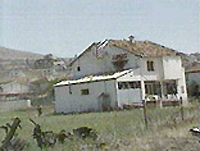
The international community is concerned about the tragic incident that happened on Sunday in the village of Aracinovo near Skopje, reads the joint press release of NATO, EU and OSCE missions in Skopje.
"We deplore the loss of life and all our sympathy is with the family of those injured and killed in the explosion," reads the press release.
The Allied Forces express belief that the police would conduct "a fair and impartial" investigation to determine the cause of explosion.
"We agree with the Minister of Interior that these incidents should not be allowed to jeopardize the peace process to progress and we should 'give peace a chance' while the Macedonian police conducts its investigation," reads the press release, also warning the citizens to be aware and cautious of dangerous articles when they visit property vacated during the crisis.
"Macedonian police will do everything to catch the perpetrators of this crime and to hand over to the judicial organs," Minister of Interior Ljube Boskovski stated late Sunday addressing bigger group of citizens of the village of Aracinovo, near the capital city Skopje, who calmly protested in front of the Macedonian parliament building due to the incident in the village when Aco Stojanovski lost his life due to activation of the planted bomb.
Minister Boskovski expressed his deepest condolences due to Stojanovski's death and called all Macedonians from Aracinovo to have trust in the Macedonian Government.
"We have witnessed another terrorist act, this time committed in Aracinovo. The international community has been also upset by this horrible act. Europe is on our side in the combat against the terrorism which is happening at this moment in Macedonia, Boskovski said, stressing that "we should bear up this heavy crisis and to give peace a chance."
On Sunday morning, at about 11,20, Aco Stojanovski from the village of Aracinovo lost his life and Tomislav Spasovski was badly injured in an explosion that happened in the village.
The incident occurred as they tried to enter the house of Stojanovski's brother, located on 10th street in the village. As soon as they opened the door a planted bomb exploded leaving Stojanovski dead. Spasevski, who stood next to him, was injured and transferred to a hospital. His condition is stabile.
Ministry of interior confirmed the incident and informed that during the search of the house other planted bombs were found. Ministry undertakes all necessary measures to solve the case and find the perpetrators of this terrorist attack. WORKING GROUP FOR PREPEARING OF A DRAFT - LAW ON AMNESTY IN SESSION. MIA 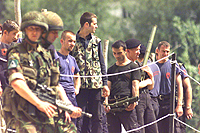
The working group, which is preparing a draft - law on amnesty, formed by the Minister of Justice, Ixhet Memeti, continued Monday its second session in order to set the details of this draft.
Law expert Vlado Kambovski, representatives of the Public Prosecutor's Office, including the Public Prosecutor Deputy, Bekir Isemi, experts from the Ministry of Justice, as well as of EU, OSCE, NATO and American Embassy also attended the meeting.
According to MIA's unofficial sources, a proposal was submitted regarding the official enforcement of the law on amnesty, i.e. from February 12 to September 26, 2001- when disarming of the so-called NLA was completed. An amnesty of certain individuals was also on the agenda.
The next meeting of the working group was scheduled for Friday. MINISTER POPOVSKI IN HUNGARY. MIA 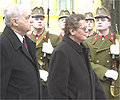
Defense Minister Vlado Popovski continues his visit to Hungary where Monday he met with Hungarian President Ferenc Madl, Hungarian Defense Minister Janos Sabo and president of the parliamentary commission on defense policy Miklos Shimon.
According to the spokesman of Macedonian Defense Ministry, Blagoja Markovski the meeting focused on the situation in Southeastern Europe and on the Balkans, where Macedonia's orientation to resolve the current crisis peacefully and in the right way was assessed as positive. Hungary's participation within the international missions in Bosnia and Herzegovina as well as in "Essential Harvest" in Macedonia was emphasized. 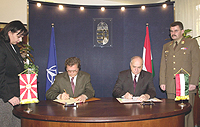
The mutual position was that the situation should be more relaxed and the crisis in Macedonia should be resolved by political means, talks and cooperation. Minister Popovski stressed at the meeting that there are many areas in which Macedonia should use Hungarian's experiences, especially the preparations for gaining NATO's membership.
The two delegations agreed that the terrorism and the criminal should not be tolerated, but enormous force should not be used in tackling them. After the meeting, the both defense ministers signed a letter of intentions, which according to Markovski will be a ground for future cooperation in the field of defense between the two countries. BULGARIA - UK - FOREIGN MINISTER. BTA Britain Backs Bulgaria's Bid for EU, NATO Membership, UK Foreign Secretary Straw Says.
London, February 11 (BTA Special Correspondent Roumyana Kinkina).
- The British Government will be reviewing the visa issue this year, British Foreign and Commonwealth Secretary Jack Straw told Bulgarian Foreign Minister Solomon Passy when the two conferred at the Foreign Office Monday during a working visit by the chief Bulgarian diplomat to London. The guest raised the question of scrapping UK entry visas for Bulgarian nationals.
Passy was assured that Britain will be supporting Bulgaria in its efforts to join the European Union and NATO. Both in respect of the EU and NATO enlargement, the Britons do not lobby for specific countries but for specific principles, which is in the interest of Bulgaria as well as all Europe, Passy told journalists after the meeting.
The two foreign ministers considered the opportunities for bilateral cooperation within the UN Security Council (of which the UK is a permanent and Bulgaria is a non-permanent member), and especially on the question of Africa. Britain has a special interest in this area, and Bulgaria has amassed sufficient experience in recent years.
Talking to Bulgarian correspondents, Passy expressed satisfaction with the results of his visit to Britain.
Britain is a strong advocate of Bulgaria's application for membership of the European Union, the UK Minister for Europe Peter Hain said Monday after conferring with Bulgarian Foreign Minister Solomon Passy, who is paying a working visit in London.
Emerging from the session with his guest, the British Minister said he was encouraged by Bulgaria's progress in the negotiating progress. Bulgaria is far ahead of Romania in the negotiations, Hain believes. He assessed in positive terms the reforms undertaken by the Bulgarian Government and noted that certain difficulties in this process are understandable but the government must press ahead along this road.
Bulgaria's accession will benefit not only your country but also Britain and the rest of the EU member states because enlargement will increase security, stability and democracy on the continent, Hain also said.
After a session with members of the Foreign Affairs Committee at the British Parliament, the Bulgarian Foreign Minister will leave for Bulgaria. BULGARIA - MACEDONIA. BTA Sofia, February 11 (BTA) - President Georgi Purvanov of Bulgaria Monday talked by telephone with President Boris Trajkovski of Macedonia, the Press Secretariat of the Bulgarian head of state said.
Trajkovski wished a successful presidency to Purvanov, who took office on January 22.
The two expressed their readiness to work for a further promotion of bilateral relations.
Purvanov and Trajkovski agreed to hold a meeting on a date that will be specified additionally, according to the press release. BULGARIA - GREECE - DEFENCE MINISTER'S VISIT. BTA Sofia, January 11 (BTA) - Greece'e National Defence Minister Yiannos Papandoniou will arrive in Bulgaria Tuesday for a two-day official visit, the Bulgarian Ministry of Defence said in a press release.
The purpose of the visit, which will be paid at the invitation of Bulgarian Defence Minister Nikolai Svinarov, is to expand bilateral military cooperation, to discuss opportunities for regional stabilization, and to specify approaches to the promotion of the integration process between Bulgaria and the Euro-Atlantic structures, the press release says.
During the visit, Svinarov and Papandoniou are to sign a Memorandum of Understanding between their ministries regarding the provision of a Greek military consultant on the promotion of Bulgaria-NATO contacts.
The guest is scheduled to confer with the President of the Republic and Supreme Commander-in-Chief, Georgi Purvanov, with Prime Minister Simeon Saxe-Coburg-Gotha, National Assembly Chairman Ognyan Gerdjikov, and Patriarch Maksim of Bulgaria. The Greek Defence Minister will also tour the Headquarters of the Multinational Peace Force Southeastern Europe in Plovdiv (South Central Bulgaria). Georghy Parvanov said that the new Director of the National Security Service would be Ivan Chobanov. News.bg 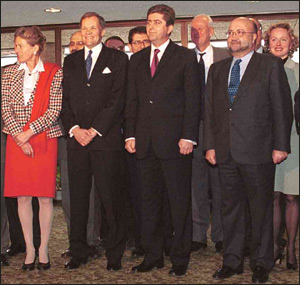
Bulgarian President Georghy Parvanov chose the Director of National Security Service to be Col. Ivan Chobanov, he said at the briefing in Kempinsky Hotel after his luncheon with European Union Ambassadors. Speaking for News.bg Agency, he confirmed his choice and said that the Cabinet should do the rest to appoint Chobanov. He did not say who suggested Chobanov. As for the resignation of Bulgarian Ambassador to Belgium and NATO, he thanked Dimitrov for his work and said he could not assess his work negatively. He said that he ordered the publication of the records from the National Security Consultative Council session on February 4, 1997.
Answering a question asked by News.bg Agency about the fate of Kozloduy Nuclear Power Plant, the Spanish Ambassador Jorin that took part in the luncheon emphasized that there was a memorandum signed by the government of Bulgaria and the European Union. He said that this issue would be discussed in the appropriate moment, and explained that technical parameters would have the priority. UDF Members Vote for UDF PG Chairwoman En Masse. Standartnews The UDF structures all over the country are insisting en masse on Nadezhda Mihailova as the UDF leader, the opinion poll of "Standart" showed. The big cities such as Sofia, Plovdiv and Bourgas are firmly supporting her nomination, local sources informed yesterday. The UDF structure in Rousse is on the verge to splinter off. Some of them remained loyal to Ekaterina Mihailova. But the support for N. Mihailova is gaining momentum. General Borissov Discusses Terrorism in Moscow. Standartnews Colonel Ivan Chobanov is a professional and will cope with the post of chief of the NSS, said the chief secretary of the IM.
It became clear yesterday that the struggle against international terrorism would be central to the talks between IM chief secretary, General Boiko Borissov and Russian interior minister Boris Grizlov. General Borissov and the chief of the 'Police' NS, General Vassil Vassilev left on a three days' visit for the Russian capital yesterday. We have a lot of common ground with Russia concerning the problems of terrorism and will sign protocols in this sphere, the chief secretary added. Colonel Ivan Chobanov is the likely nomination for the post of chief of the 'Security' NS, said Borissov. In his view colonel Chobanov is a good professional and will cope with the post of director of NSS. He was IM secretary and is currently my adviser, I have chosen him and this means that I can rely on him, general Borissov added. The IN chief secretary confirmed that the now deputy interior minister Roumen Stoilov would be appointed director of the 'Border Police' NS. Iltchev: We Want Russia to Cut Down Customs Duties. Standartnews Today the Bulgarian parliament will vote for the reduction of Russian customs duties for the Bulgarian goods. The parliamentarians will hold a meeting with the chief of the International Issues Committee to the Russian Duma, Dmitri Rogozin. They will specify the text of the new visa agreement which has to be signed by the end of the month. We shall discuss the issues pertaining to Russian realty in Bulgaria and the ways of paying off the Russian debt to this country, explained chief of the foreign committee Stanimir Iltchev. In his opinion, a new bilateral Bulgarian-Russian stand on the transformation of the Soviet property into Russian. Further on this stand should be proposed to Ukraine.
Nadelina Aneva Sofianski Lectures in Oslo. Standartnews Silvia Nikolova
Sofia Mayor Stephan Sofianski is to deliver a lecture before the congress of the Council for Local Initiatives and Steady Development which was opened in Oslo yesterday. Sofianski is a member of the managing board of the organization. The mayors of 60 more European cities with Joan Kostadinov - mayor of Bourgas - among them. Today Sofianski will have talks with the Mayor of Oslo on the topic of how Sofia is developing and what investments were attracted by the municipality of the Bulgarian capital. Englishman to Promote Bulgaria for NATO Membership. Standartnews There are no arguments against Bulgaria joining NATO, said Alan Williams in a interview for the Bulgarian National Radio. He is the chairman of the British Atlantic Council and the Association of the Atlantic Treaty. The diplomat expressed his personal opinion that it would take place at the summit to be held in Prague in November. I'd be disappointed if it wouldn't happen this way, Alan Williams said further. Salaries Are Already Melted by Inflation. Standartnews Restaurant and hotel owners start a protest against the taxes on March 1, Dr. Zhelyazko Hristov warns.
The CITUB announced several days ago a procedure for a general strike, if there isn't an agreement with the government and an adequate attitude to the social partners. For now the 'Podkrepa' trade union restrained from a commentary, but warned that one trade union couldn't organize a general strike alone. 'The salaries are practically devaluated by the inflation at the end of the year, by the expected higher percent in the first three months of 2002, by the real rise of the prices, Dr. Zhelyazko Hristov said in an interview before 'Standart'. '275 levs per month are necessary to a person from a family of four members. The average monthly salary in the country is 250 levs. When we add the tax weight, the indirect taxes, the horrible litter tax, the increased inhabited house duty, the new insurance weight increased by 2,5% since January it becomes clear that the life of people is heavier than a year ago. Bulgaria is in much heavier economic situation on February 17, than on June 17, 2001, leader of CITUB said.
Dilyana Dimitrova Commercial Attaches Replaced Again. Standartnews The Bulgarian representatives abroad will advertise Bulgarian wines.
Kostadin Arshinkov "We are to replace those of the commercial attaches who are not working well," said vice-premier Nikolai Vassilev at a meeting with vintners and wine-growers, participants in the "Vinaria 2002" exposition in Plovdiv during the weekend. He proposed the opportunities of the Bulgarian representatives abroad to be used for popularizing the Bulgarian wines. Most of the attaches were replaced in the last fall after competitions, carried out by Deputy Minister Lyubka Kachakova. "We could use the financial resources of the Pension Funds to credit the vintage and wine production in Bulgaria," said Vassilev. In this way the vice-premier answered to the fears of the people in the field that the situation of the Bulgarian vineyards and the rates of their replanting and restoration are quite alarming. Parvanov Impressed Brussels and Strassburg. Standartnews The president made a strong start in the field of foreign policy, his messages were understood.
ANTOANETA MARKOVA
Brussels-Sofia
Bulgaria wants to be a member of the European Union and NATO. This is what head of state Georgi Parvanov stressed at all his meetings in Brussels and Strassburg. Actually, that was the major aim of his first visit abroad in his capacity of president - to utter the clear message that Bulgaria's foreign political priorities and aims remain unchanged. And he chose the most suitable place for his message - Brussels, the capital of Belgium, of Europe and of NATO's seat. His hosts comprehended the message. The European Commission is extremely flattered by the fact that President Georgi Parvanov's first visit is to Brussels, European Commissioner for the enlargement Guenter Verheugen stressed after his meeting with Parvanov. At it the commissioner was assured that Bulgaria was resolved to go ahead with its foreign policy towards Euroatlantic integration. And that the new president is firmly behind the commitments undertaken by the previous executive and presidential power. Bulgaria sticks to the memorandum with the EU for a stage by stage closure of the 'Kozloduy' NPP, signed in 1999, President Parvanov repeatedly pointed out in Brussels. His position brought in the clarity which the Europeans had obviously needed after the debates on the NPP which again flared up in Bulgaria in the past few weeks. Parvanov addressed another clear-cut message in Brussels: the Bulgarians have already understood that it's better to complete their work at home before fixing hypothetical dates on an eventual future membership. However, his stand didn't sound conciliatory. Because the head of state stressed another ambition - that the European Commission writes in its next year's report on Bulgaria that our country is an operating market economy. Which is a condition for membership not only of the European Union, but of NATO as well. In the headquarters of the pact in Brussels, in the seat of NATO's European Forces, Georgi Parvanov assured the NATO leaders that he, and the army and the entire society support and work towards our membership. He declared before Lord Robertson, General Joseph Ralston, as well as his partners from Belgium and united Europe that the Bulgarian political model was steady and stable. And also that Bulgaria respects and upholds minorities' rights.In an interview for a Belgian daily Parvanov dispersed the doubts of the Belgian journalists and said they should not expect any alarming political news from Bulgaria. He said, he worked well with Premier Simeon Saxe-Coburg and appealed that the two should not be assessed by their past. Because they were elected not because of it, but because of their vision of the future. Georgi Parvanov didn't conceal Bulgaria's problems from his European hosts. However, he assured them that this country was making efforts to resolve them and demanded from his partners openness, understanding and cooperation. In order to prevent the spreading of euroscepticism within the Bulgarians. Someone Wants Kremikovtsi to Go Bankrupt. INTERVIEW Standartnews: Atanas Katsartchev Those who manage the company are to blame, says deputy Finance Minister, Atanas Katsartchev.
Stefan Kioutchukov 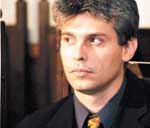
- Mr. Katsartchev, the debts of Kremiovtsi steel plant to the customs worth of 2,5 million levs were just a pretext to block the ships with their supplies. How much does the plant owe to the state? - Kremikovtsi started amassing debts to the state from 1999 and now they amount to 100,000 million levs. The biggest sum the plant owes to the National Insurance Institute - it is more than 50 percent of the plant's debts. At the same time the sick leaves of some workers are really long. Some were on leave for months. And certainly the state covers the expenses. - Why was it exactly now that the ships with cargoes for Kremikovtsi were distrained? - In principle, the natural situation could be described as creating favorable conditions for paying in the revenues to the budget on a regular basis. However, Kremikovtsi are indebted to the state since 2000. We cannot afford to wait for the plant to process the necessary documents for more than one year, in order to prove where are the goods imported in 2000. - What is the role of trade unions in this argument? - As long as the situation on the whole is rather interesting, I could say that the trade unions are used to prove that the state wants the plant to go bankrupt. But the actual financial status of the plant is not at all good. So, it is not the state who is the culprit, but the plant's management. - After all, the detained ships were released. What can you say about your negotiations with Kremikovtsi? - We have agreed that they will pay the sum due for 1999 till end-February. But then we received a letter from the plant, saying that they want to reschedule the debt till March. We did not agree, because we were holding other negotiations. Then, they sent another letter, promising to pay before February 28. This goes to support the opinion that this is not a really fair game as regards the state. - How much must Kremikovtsi pay till the end of February? - They have to pay what they owe to the customs. Then, they have to come out with a plan to prove that they can pay off the amassed debts. And these are not the debts from the period before privatization, but the liabilities accumulated after the venture was bought by Daru Metals. They even set a deadline - April 30 - to complete all analyses. - Will you have negotiations this week? - Yes, we have to negotiate to make clear what are our individual stands. We have to understand how honorable we are as parties to a contract, we have to know to what extent the state has to interfere. The state is not interested in stopping the plant, but to me the facts suggest the conclusion that probably someone wants to make plant the plant bankrupt deliberately. And to present the situation as if the whole country has gone bankrupt. MPs Don't Push Forward Cadres of Their Own. INTERVIEW Standartnews: Kostadin Paskalev "The no confidence motion will not result in dangerous aftermath," Vice-PM Kostadin Paskalev.
Pavlina Zhivkova 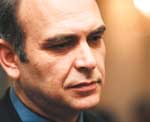
- Mr Paskalev, is there any danger that another no confidence motions are to supervene on this one? - I don't think so. In end-2001 there were problems requiring urgent measures, in view of the situation we found, and these measures were not necessarily concerted with the all-round development of this country. Now, I'd say, things look quite differently. Concepts and strategies are being drafted about each of the sectors of the public and economic life. It provides an opportunity the society to carry out a profound discussion about each of the problems concerning directly the life conditions of the Bulgarian citizens. This is why, from this point of view, I think that there are no problems within the government. - Some time ago you said that, at present, the NMS rule looked like that of the UtdDF at its last stage. - In end-2001 it did really look like the UDF rule. It searched to satisfy certain fiscal commitments while drafting the Budget '2002, i.e. to reach the balance necessary for the state to go on functioning. This is why precisely, the change in the cabinet's attitude is in line with developing concepts and strategies to be reinforced with direct real management decisions. - Was the issue of the constant deputies' demands for appointments and attempts for cadre policy solved? - There wasn't such an issue. It had not been raised either by the deputies, or by the ministers. In fact, the actions were elaborated on that would have to be carried out in each sector. It is quite more important or substantial than one or other decision concerning cadres. - Why the establishing of a consultative council for economic growth turned out to be impossible if this council was willing to help the government? - Such a council will be established and it will work in a helpful and adequate way. (Abr) The Premier was awarded with the Economic Person of the Year award. News.bg The Greek business community in Bulgaria bestowed Premier Simeon Koburg-Gotha with the Economic Person of the Year award for 2001. The award, representing a copy of an antique statue, was given by the Greek Ambassador Michalis Christidis. This is the first time the Greek community in Bulgaria is giving its award, and expressed hopes it could turn into tradition. On receiving the award, Premier Simeon Koburg-Gotha said that Greek businessmen in Bulgaria should not be discouraged by corruption, bureaucracy and unfair competition, and reminded that his governments main task was the overcoming these problems. Kosovo Refugees, Victims of KLA Terror, Ask for Help. Refugee Committee of Roma,
Ashkali, & Egyptians from Kosovo 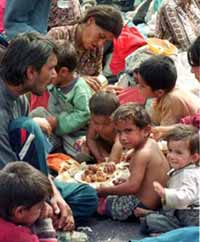
Subject: Info and support
Ladies and Gentlemen,
the Refugee Committee representing Roma, Ashkali, Egyptians from Kosovo in Macedonia, accommodated in the camps in Suto Orizari and Katlanovo and the Refugees in the private accommodations, informs you that from the
30 January the Refugee Committee started with its official work.
The Refugee Committee is placed in the frame of the International Educational Centre ROSH in the Municipality of Suto Orizari.
The Refugee Committee is financed by OSCE ODHIR Warsaw in cooperation of UNCHR, OSCE Mission in Macedonia, ARC, Municipality of Suto Orizari and CRZ DROM Kumanovo.
Provider Organisation of the project is the Roma Centre "ARKA- pomos" from Skopje. For successful work of the office and sustainability, the Refugee Committee needs financial support to reimburse the direct costs, communications expenses, office material and other expences of the office.
For more information about the Refugee Committee please use the following contact information: Refugee Committee of Roma, Ashkali, Egyptians from Kosovo
Vieatnamska 22
Suto Orizari
refugeek@.sonet.com.mk
Tel/fax: 02 654 984
kontakt person Musli Djulisan Milosevic finally going on trial, but so is the war crimes court. the Scotsman CHRIS STEPHEN
ONE of the biggest war crimes trial in history begins tomorrow with the former Yugoslav president Slobodan Milosevic in the dock - along with the system that is prosecuting him.
Never before has a head of state stood before a court accused of such grave crimes. With more than 200 witnesses and a charge sheet of more than 30 pages, the chief prosecutor, the Swiss lawyer Carla del Ponte, expects the case at the international war crimes court in The Hague, Holland, to last two years.
Milosevic is seen by many as the architect of a decade of chaos in the Balkans, using his position as the head of a disintegrating Yugoslavia to wage war in Slovenia, Croatia, Bosnia and finally Kosovo. More than 150,000 died, and more than four million became homeless, in a decade of carnage that sent ripples across the globe.
He is charged with crimes during three of those wars: First will come the Kosovo case, with the Croatian and Bosnian indictments being folded in during hearings this summer.
The Kosovo accusations are grim enough. As head of state and of the armed forces, he is blamed for ordering a string of massacres of ethnic Albanian Kosovars, including 45 civilians butchered by special forces on a hillside near the village of Racak in January 1999.
That killing, which led directly to a crisis that saw NATO go to war in Yugoslavia, has left a permanent stain on Kosovo, with hatred still boiling between Albanians and Serbs.
Milosevic, 60, is charged with four of his lieutenants - all still at large in Yugoslavia - on two counts: Crimes against humanity and violations of the laws and customs of war.
Stripped of the legalese, the accusations are that although Milosevic did not pull the trigger, he is responsible for the massacres, as well as the deportation of 750,000 Kosovar Albanians, as commander in chief.
The Hague has no death penalty, but if found guilty, Milosevics sentence is expected to exceed the longest yet given out by the court - 46 years. But even amid the courtroom drama, the lawyers and judges and officials of the nine-year-old tribunal will be keeping one eye over their shoulder.
The Milosevic trial might be the biggest this court has ever held, but it also mark its swan song. With the Balkan wars apparently over, the world has lost interest in prosecuting those responsible.
The United States has indicated it wants the tribunal wound up by 2007, while Russia says it wants the court to stop even earlier.
All of this augurs ill for attempts to make the court - currently confined to prosecuting crimes from the wars in the Balkans and Rwanda - into a permanent body.
The Nuremberg trial of Nazi leaders never fulfilled its brightest promise - a permanent international tribunal for war crimes. However, for the first time, a permanent international war crimes court with a worldwide brief is close to being agreed. Still, while it is likely to come into being this summer, it so far lacks the heavyweight support of, crucially, the United States, without which it could be stillborn.
The International Criminal Court was agreed by more than 100 nations in Rome four years ago. Last week Portugal became the 52nd nation to ratify it formally, joining the UK and most European Union countries.
If this total hits 60, as is expected this summer, the ICC will become permanent and the world will have a court. But many states, notably China, Russia and the US, are sceptical. The former US president Bill Clinton signed the ICC treaty last year on his last day in office, However, the Bush administration and the US Congress are wary about the prospect of US troops or commanders ending up in the international dock. Congress is likely to refuse support, creating the sort of division that could hamstring a world court.
Much then will depend on the ability of the present court to convince a wider world that war crimes trials work. Even here it faces problems.
Some think the court is concentrating on the wrong man. Milosevic, as head of Yugoslavia, the Serb-dominated republic, was the strongman at the head of the various Balkan wars. But the two Serbs guilty of ordering the worst crimes remain free.
The former Bosnian Serb president, Radovan Karadzic and his army commander, Ratko Mladic, remain at large in Yugoslavia, and with little international pressure on the authorities to bring them in.
Both are accused of the bombardment of Sarajevo and the massacre of 7,000 unarmed Muslims in Srebrenica in 1995. But without more pressure, especially from NATO troops in Bosnia, both men could remain free.
"Its very important not to allow a high-profile case such as this [Milosevics] to mask the failure to arrest Karadzic and Mladic," says Duncan Bullivant, former press officer with the International High Representative mission to Bosnia. "Unless those two are apprehended the process for recovery in Bosnia will remain in suspended animation."
The case against Milosevic appears strong. His armed forces did carry out atrocities, and he was in command. Milosevics defence is to have no defence, since he fails to recognise the legitimacy of the court. He has refused a defence lawyer - although he has a team of legal "advisers", including the star French attorney Jaques Verges, famous for defending Carlos the Jackal.
Their advice is to go for the seams. First, they say the court has questionable legitimacy as it was set up by the UN Security Council in response to the atrocities of the Bosnian war, without a full mandate from the general assembly. Second, they claim its prosecutions are highly discriminatory - prosecutors expect to try just 150 people, out of the tens of thousands responsible for a decade of mass murders.
The court must also answer the charge of selectivity - war crimes are common around the world, with Afghan atrocities being only the latest example. Why, then, jail people only for the Balkans and Rwanda?
"Its like the headmaster wading into a playground full of fighting boys and grabbing two by the ear and saying: Im going to cane just you two," said one highly placed Hague war crimes lawyer.
The court can do little to fight these accusations other than press on with the case. Recent convictions have been controversial, including that of a Bosnian Croat general, Tihomir Blaskic, jailed for 45 years for the murder of Muslims in 1993.
Demonstrations have erupted in Croatia over the case, with protesters claiming the killings were done by different units. His supporters include the former MP and broadcaster Martin Bell, who says not that Blaskic is innocent, but that the case against him remains not proven.
For The Hague, the key aspect of the Milosevic trial will not be in a conviction - for which there will be huge political pressure - but for ensuring that justice is very publicly seen to be done.
The key figures at The Hague
SLOBODAN MILOSEVIC
Despite fanning the Serb nationalist sentiment that ignited wars killing and displacing hundreds of thousands, the former Serbian and Yugoslav president, 60, insists he was simply defending his people.
The former communist functionary made his name pledging to protect minority Serbs against the Albanian majority in Kosovo, where his 1999 crackdown led to indictment for crimes against humanity. He is also accused of genocide in Bosnia and crimes against humanity in Croatia.
CARLA DEL PONTE
The feisty Swiss-born Ms Del Ponte, 55, rose through the ranks to become her countrys top prosecutor and headed the Swiss judiciary, police and secret services before joining The Hague tribunal in 1999.
She has chased dirty money dealings by cocaine cartels and squared up to Italian and Russian mafiosi.
GEOFFREY NICE
London-born Mr Nice, 56, is the principal attorney for the trial. Eloquent and thorough, he successfully prosecuted the self-styled "Serbian Adolf", Goran Jelisic, and the Bosnian Croats Dario Kordic - the first senior politician convicted in The Hague - and Mario Cerkez.
DIRK RYNEVELD
Mr Ryneveld, a senior trial attorney, was born in Rotterdam in 1946 before moving to Canada, where he prosecuted dozens of murder trials. At The Hague his successes include convicting three Bosnian Serb commanders in a landmark prosecution of rape and sexual enslavement as crimes against humanity.
RICHARD MAY
Firm, fair and a stickler for the rules, Mr May, 63, has given Milosevics anti-tribunal tirades short shrift during pre-trial hearings. The London-born Mr May is a plain-speaking veteran who was educated at Cambridge and served as circuit judge. |



